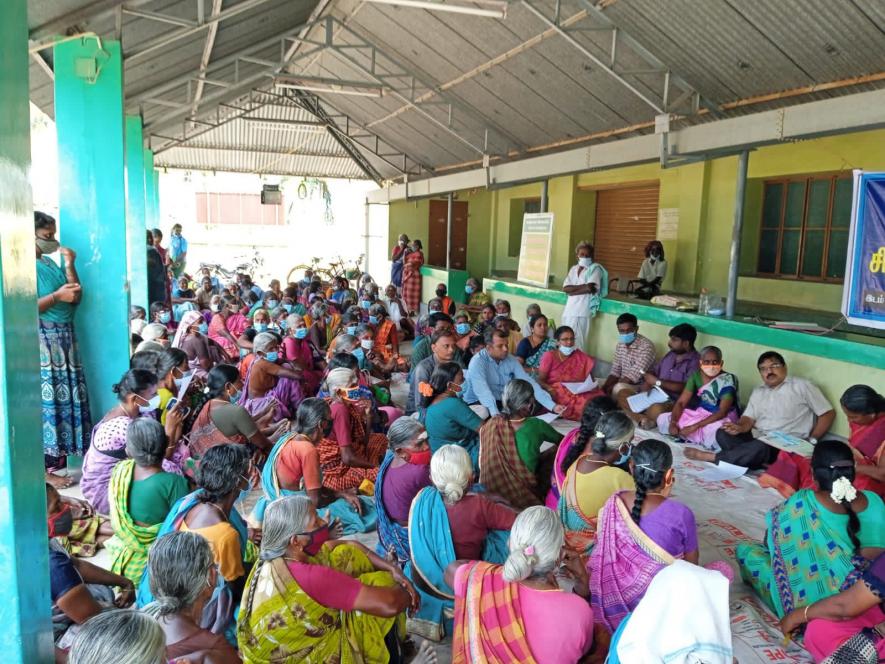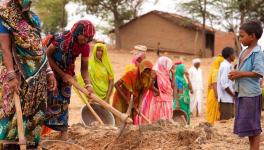Tamil Nadu Gram Sabhas to Meet 6 Times Annually, Activists Demand Awareness

A gram sabha meeting in Tirupur. Image courtesy: CSC, Tirupur.
Grass-root activists working to create awareness about local bodies and their empowerment have hailed the Tamil Nadu (TN) government’s decision to hold gram sabha meetings six times a year.
On April 22, chief minister (CM) MK Stalin announced in the Assembly that besides Republic Day, Labour Day, Independence Day and Gandhi Jayanti, gram sabhas would meet on World Water Day and Local Governance Day. Stalin also announced the setting up of village secretariats to help implement government schemes in rural areas and enhanced the sitting fees for elected representatives of the rural local bodies.
Though November 1 was always observed as Local Governance Day by the Dravida Munnetra Kazhagam (DMK) government since 2007, the practice was discontinued when the AIl India Anna Dravida Munnetra Kazhagam (AIADMK) came to power.
Earlier in the year, the DMK government decided to cancel gram sabha meetings on January 26 citing COVID-19 concerns. The party drew ire for asserting the importance of the gram sabhas while in the Opposition but cancelling the Republic Day meetings after assuming power.
While in the Opposition, the DMK had protested against the AIADMK government’s cancellation of gram sabha meetings on Gandhi Jayanti in 2020. The party also held sabhas by mobilising people in villages in districts as part of its election campaign.
A WELCOME MOVE
Social activists and organisations working at the grass-root level to build strong local governance, who had criticised the DMK government for cancelling the R-Day gram sabhas this year, welcomed the announcement.
Thanaraj Radhai, state convenor, Ekta Parishad, told Newesclick, “At the peak of COVID-19, Stalin held makkalai thedi grama sabhai. But citing the pandemic, he cancelled the meetings on January 26, which was not received well. The announcement is a welcome move. In a democracy, discussion is very important.”
Welcoming the decision, Nandakumar Siva, general secretary, Thannatchi, said “A gram sabha can be convened by a Panchayat president any time of the year. The days fixed by the government are only mandatory for holding meetings. This is a positive step towards enhancing local governance.” Thannatchi (self-rule) is an organisation working towards creating awareness about local body governance.
NEED FOR AWARENESS
However, activists say that such announcements are not sufficient and the state government should make villagers, Panchayat members and officials aware of the role of gram sabhas.
“Increasing the number of mandatory days of gram sabha meetings is a good move but it is important to make the sabhas functional and transparent. It is also important that the resolutions passed at sabhas are handled seriously by officials and implemented without delay,” Siva added.
Radhai pointed out how due to lack of awareness it has become common for the local bodies to say that a sabha wasn’t held “due to lack of quorum”. “That should not be the case. The Panchayats should be aware. The quorum for a meeting of the grama sabha should be one-third of the total number of members.”
Thangasamy, an activist and member of the Kadar tribe, near Parambikulam, Coimbatore, said, “As per protocol, officials must participate in gram sabha meetings. But forest and revenue department officials don’t attend meetings despite our repeated requests.”
Explaining the importance of awareness of gram sabhas, film director Lenin Bharathi told Newsclick, “I went to Thiruvannamalai for a shoot. Farmers of Paliapattu village are protesting the appropriation of their land by the state government for setting up the SIPCOT IT Park. Two gram sabhas have passed resolutions against the appropriation of their land because they understand their power and are making use of it.”
The 73rd Amendment empowered state governments to take necessary steps that would lead to the formalisation of gram panchayats and help them operate as units of self-governance.
A FOREST HAMLET
Important decisions are taken in several villages where gram sabhas are held regularly under the supervision of activists and communicated to officials. Dinakaran Pandian is one such activist in Dindigul district, Kodaikanal Taluk, Pannaikadu Panchayat.
In the Pannaikadu Panchayat, the gram sabha meets once a month, takes decisions and communicates them to the officials. The forest-dwelling communities in the region are fighting for their rights over the forest produce and land.
“We had no idea about gram sabhas. Dinakaran Pandian helped us understand them. We have been meeting regularly, taking decisions and communicating them to the government in the last five years. We have so far submitted around 30 memorandums,” said Murugaiya of Machchur village, Pannaikadu. “But we haven’t received a response from the government.”
Durai Raj, president of the Panchayat, said, “This is not occupied land. It was allotted to us by the then-government. Now, we are getting notices after notices asking us to vacate it.” Murugaiya, who realised the importance of gram sabhas, said that “officials cannot act by-pass the gram sabha decisions. We have official rights and we are confident of winning the fight”.
Radhakrishnan, a resident of Machchur, said, “Gooseberry, mustard, etc. are harvested by us but they are sold through the forest department after paying the middlemen. We hardly get any profit. Now, we have decided to sell our products directly in the market through the gram sabha. Earlier, we used to be small-scale farming in the forest fearing the forest department. Thanks to the gram sabha, we now know about our rights as mentioned in the Forest Rights Act.”
Attending meetings in hilly regions is a problem. “The Valparai Panchayat includes 15 villages which are far off from the main area, where meetings are held. It is difficult for villagers to travel so far. We want the meetings to be held in different villages on a rotational basis for widespread participation,” Radhai said.
Regarding gram sabhas that include tribal and non-tribal villages, Mahendra Prabhu, an activist of the Ekta Parishad, based in Pollachi town, Coimbatore, said, “If Adivasis place five resolutions, only one might be implemented. They are unable to speak up and are sidelined.”
There are about 12,524 village Panchayats in this state and a gram sabha is a part of a village panchayat, which consists of all its residents.
Get the latest reports & analysis with people's perspective on Protests, movements & deep analytical videos, discussions of the current affairs in your Telegram app. Subscribe to NewsClick's Telegram channel & get Real-Time updates on stories, as they get published on our website.
























